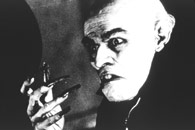

|
| home | movie reviews | features | sov horror | about | forum |
Shadow of the Vampire B
Year Released: 2000
To fully enjoy Shadow of the Vampire, it helps to have a passing familiarity with Nosferatu, F. W. Murnau's beautiful silent version of the Dracula legend. Since the Stoker estate refused to license him, Murnau simply transposed the story to the Carpathian woods and told of Count Orlock, a vampire infatuated with the young wife of his real-estate agent. Traveling to Bremen to drink her blood, Orlock spreads disease and death until he is snared by the wife in a scene of disturbing seduction and self-sacrifice. Eerie, expressionistic, and teeming with macabre, suggestive visuals, Nosferatu remains the definitive bloodsucking movie. In 1922, Murnau hired Max Schreck, a notable stage actor, to play the title role in his horror fantasy. Time has forgotten Schreck's work with the Berlin Staatstheater, and also his association with producer Max Reinhardt, the most important figure in German theater during the Twenties. Today he is mysterious, remembered only for his cadaverous interpretation of Orlock, his second role for the screen. Our collective patchy memory makes the central premise of Shadow of the Vampire, which recounts the making of Nosferatu, easier to swallow. Now, in 2001, director E. Elias Merhige wants us to believe that Schreck was so convincing as a vampire because, well, he really was a vampire. Merhige's bold-goofy proposition is irresistible. In this fanciful version of events, Murnau is obsessed with creating a masterpiece, and cuts a secret deal with Schreck: Appear in my film, and you can munch on the leading lady's neck. With that one playful twist, Merhige turns Shadow of the Vampire into a gothic comedy about how moviemaking is a lot like bloodsucking. "You're not that different from me," Schreck pouts after Murnau scolds him for chomping on the trusted cameraman. Like a deathless vampire, Murnau (John Malkovich) is a director willing to draw blood as a means to achieve immortality, to be remembered forever through his lasting art. He understands what Oscar Wilde meant when he said "Every portrait that is painted with feeling is a portrait of the artist, not of the sitter." As a portrait of the artist as a young director, Malkovich completes a very funny hatchet job on Murnau. In real life, Murnau was a student of art and literature, and a supremely talented film stylist. (His best work is Sunrise, made in 1927, and, I think, one of the greatest of all films.) Malkovich plays him instead as a flashy monomaniac, a demanding field marshal who masks his selfish ambitions by promising to enshrine his performers on celluloid. Frightfully unscrupulous, he connives to shape the most terrifying vampire movie ever, even if it means resorting to real violence. In one of Shadow of the Vampire's most amusing scenes, Murnau schemes to have an actor actually slice his finger, achieving "authenticity" when Schreck, mad with hunger, lunges at the wound. Murnau gets his shot -- but why isn't the film crew troubled by Schreck's feeding frenzy? They have been warned that Schreck is an intense actor with strange methods: He will appear to them only in character, will only shoot scenes at night, and must not be spoken to. We know why Schreck will only perform in darkness, and Murnau knows why he must keep the personnel away from him -- at least until Nosferatu's shoot is wrapped -- but everyone else simply considers Schreck an eccentric genius. "What an actor!" the writer exclaims after Schreck yanks a bat from the air and eats it alive. Since Merhige plays that scene, and indeed the entire film, as dark farce, Shadow of the Vampire depends largely upon Willem Dafoe's performance as Max Schreck. Deftly balancing the comedy with nightmarish pathos, Dafoe is magnificently witty. With his balding, puckered pugface, narrow rat eyes, and stained talons, he strikes a remarkable visual pose, and Merhige lights him as Murnau himself might have. Best of all, Dafoe transports himself to a bygone era. Inspired by silent-film theatrics, he grossly exaggerates his facial expressions and relies on sweeping, hyperbolic physicality. (In several scenes, his sneering, unhappy grimace serves as effective comic punctuation.) Dafoe's Schreck is a self-pitying hedonist, but he's also a waggish parody of petulant celebrities who vainly "eat" writers and co-stars to feed their own egos, metaphorically draining the blood of their collaborators. "I don't think we need the writer any longer," Schreck snarls, mostly because he fears sailing and the writer has set several scenes aboard a ship. Like any exasperated director trying to salvage his vision, Murnau accommodates his difficult star. Still, Murnau retains control, telling Schreck he "will have no close-ups! None!" Shadow of the Vampire is about dueling egos, and the great joke of this vampire movie is that the bully film director, not the undead bloodsucker, is the real monster. Exploiting Schreck, his crew, and his financial investors in order to satisfy his own artistic desires, Murnau hopes to create an enduring classic and exempt himself from forgotten history. Although Shadow of the Vampire wants to exist at times as a straight-forward vampire flick -- charting the trail of blood that begins to coagulate on Murnau's set -- it is far more successful fleshing out the two impish conceits of Steven Katz's script: Max Schreck as vampire, F. W. Murnau as fiend. Despite the re-enactment of many scenes (and interweaving of actual footage), Merhige's movie bears little resemblance to Murnau's Nosferatu. The original film found spooky dread in its images, but Shadow of the Vampire finds prankish humor. Review published 02.01.2001.
|

|
| home | movie reviews | features | sov horror | about | forum |
| This site was previously at flipsidemovies.com from 2000 to 2008. |
|
contact | copyright | privacy | links | sitemap
Flipside Movie Emporium (FlipsideArchive.com)
|